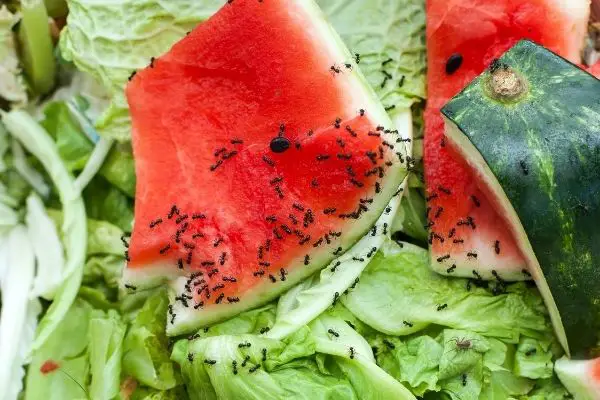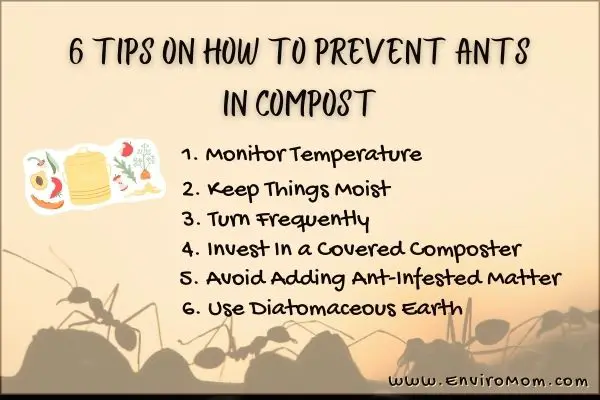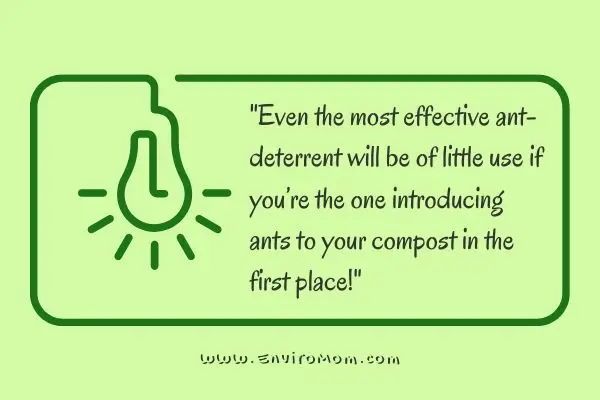Do Ants Ruin Compost? [And What To Do If You Find Them]
You can’t be a gardener without coming face to face with a few creepy crawlies!
The tricky part is knowing which bugs are a necessary part of the ecosystem and which are causing irreversible harm to your garden beds.
But the garden isn’t the only place insects can make an appearance.
Outdoor compost is a literal buffet of partially decomposed food and plant matter. So it should come as no surprise when your compost inevitably attracts a colony of ants.
Ant-filled compost is far from a worst-case scenario. But there are still consequences to letting the local ant population call your compost heap home.

Are Ants Bad for Compost?
In most cases, finding ants in compost is neither a good nor bad thing. They are simply a part of the process.
While ants aren’t necessarily bad for compost, there’s nothing wrong with wanting to keep your new compost bin or heap insect-free. (And there could come a point where previously harmless ants completely take over a compost pile.)
Are Ants Good or Bad for the Garden?
Again, yes and no.
On the one hand, ants are an essential member of the garden ecosystem. They help break down old plant matter and control many varieties of garden pests. And they do all this while rarely targeting the living plants themselves.
On the other hand, ants are deceptively clever little creatures. So clever, in fact, that they are known to “farm” aphids by protecting them from predators.
Aphids are very small insects that feed on plant matter. In large numbers, aphids can do significant damage to a flower or vegetable garden.
Thanks to this fascinating relationship, ants can indirectly hurt your garden by increasing the aphid population.
How To Prevent Ants In Compost: 6 Tips

1. Monitor Temperature
Most gardeners know that temperature can make or break a compost pile. The right temperature can also keep ants away from your compost!
Ants can tolerate temperatures below 140℉. So to stop ants from making a home out of your compost heap, be sure to keep the average temperature above this point.
2. Keep Things Moist
Ants are attracted to dry compost piles because they are perfect for building a nest and provide a nearby food source. Upping the moisture level can make your compost much less attractive to these little crawlers!
Adding water to compost is rarely necessary but will do little harm in moderation. Keep an eye on your compost during hot and dry weather and sprinkle with water if you notice it drying out.
3. Turn Frequently
It’s one thing for the local ants to use your compost as a food source. It’s another thing entirely for them to set up permanent residence inside.
Nearly all compost should be turned frequently for aeration and proper distribution. This simple act of maintenance can also break up new ant nests before they have a chance to become truly established.
4. Invest In a Covered Composter
Covered compost bins are great for a number of reasons. But one of the biggest selling points is how easy it is to keep insects and other pests from getting inside.
Covering your open-air compost pen with a plastic tarp can help retain moisture and heat while keeping insects out. Just be sure not to smother the compost by leaving it covered for too long.
5. Avoid Adding Ant-Infested Matter

Before placing lawn or garden waste into your compost, thoroughly check the material for ants. Ants aid in the natural decomposition cycle and can often be found hanging out in piles of fallen leaves or underneath rotting pieces of wood.
If you do find ants, there’s no need to keep those materials out of your compost entirely. Just be sure to remove all of the ants before doing so.
6. Use Diatomaceous Earth
Diatomaceous earth is a rather fascinating, naturally occurring material made of fossilized algae. It’s frequently used as an organic pesticide in the garden and beyond.
Adding diatomaceous earth to your compost can be a great way to deter ants (and other insects) from taking refuge inside.
Frequently Asked Questions
Can I use compost with ants in it?
Yes! Unless that is, you have a reason to keep ants out of your soil.
Using ant-infested compost is a non-issue in most garden beds. Ants will find a way to get to your plants one way or another but will generally do no harm. In fact, many ants can benefit the garden by keeping other pests at bay.
Meanwhile, using compost with ants to fertilize indoor planters or houseplants probably isn’t the best idea. While the ants won’t do any harm to the plants or their soil, they could easily spread throughout your home.
Will ants hurt worms?
No! Ants will not hurt worms and vice-versa.
Ants and worms are used to cohabitating in nature. Aside from potentially competing for food (which there is no shortage of in a vermicomposting bin!), neither the ants nor the worms will be concerned with the other’s presence.
Of course, there are several reasons to prevent ants from entering your worm bin. But the safety of the worms is rarely one of them.
How do you deter ants from a worm bin?
Keeping ants away from a worm bin can be tricky, largely because some of the most effective methods may also hurt the worms.
For the safety of your worms, focus on the bin’s exterior.
Some strategies to try include creating a moat or applying petroleum jelly to the outside of the worm bin. Ants will be unable to cross either of these obstacles.
It’s unknown whether diatomaceous earth is 100% safe for worms or not. To be safe, avoid adding it to your worm bin directly. Instead, create a ring of diatomaceous earth around the outside perimeter.

![Do Ants Ruin Compost? [And What To Do If You Find Them]](https://enviromom.com/wp-content/uploads/2021/09/Do-Ants-Ruin-Compost-And-What-To-Do-If-You-Find-Them.jpg)




